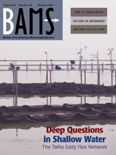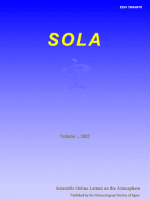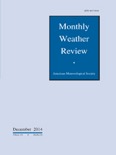
Atmospheric Science Letters
Scope & Guideline
Pioneering insights for a sustainable future.
Introduction
Aims and Scopes
- Atmospheric Dynamics and Weather Patterns:
Research in this area encompasses the study of atmospheric circulation, weather events, and their interactions with geographical features, including the dynamics of tropical cyclones, extreme precipitation, and temperature extremes. - Climate Change and Variability:
This scope includes investigations into the impacts of climate change on atmospheric conditions, long-term trends in temperature and precipitation, and the role of anthropogenic factors in altering weather patterns. - Remote Sensing and Data Assimilation:
Studies utilizing remote sensing technologies and data assimilation techniques to improve weather forecasting and climate modeling, focusing on enhancing the accuracy of predictions for atmospheric phenomena. - Statistical and Machine Learning Approaches:
The journal increasingly features research employing statistical methods and machine learning techniques to analyze atmospheric data, improve predictive models, and address complex climate-related challenges. - Impact of Aerosols and Pollution:
Research on the influence of aerosols, greenhouse gases, and other pollutants on atmospheric processes, including their effects on precipitation patterns, cloud formation, and overall air quality.
Trending and Emerging
- Extreme Weather Events:
There is an increasing emphasis on the study of extreme weather events such as heatwaves, heavy rainfall, and tropical cyclones, particularly in the context of climate change and its implications for future weather patterns. - Machine Learning in Meteorology:
The application of machine learning techniques for weather prediction, data analysis, and model improvements is gaining popularity, reflecting a broader trend towards integrating advanced computational methods in atmospheric science. - Regional Climate Impact Studies:
Research focusing on regional impacts of climate change, such as the effects on specific geographical areas or communities, is on the rise, highlighting the need for localized climate adaptation strategies. - Interdisciplinary Approaches:
There is a growing trend towards interdisciplinary research that combines atmospheric science with other fields such as ecology, public health, and urban planning to address complex environmental challenges. - Real-time Monitoring and Forecasting:
The journal is increasingly featuring studies that emphasize real-time monitoring and forecasting capabilities, leveraging advancements in observational technologies and data assimilation for timely weather alerts.
Declining or Waning
- Traditional Numerical Weather Prediction Methods:
There has been a noticeable decline in studies focused solely on traditional numerical weather prediction methods, as researchers increasingly favor innovative approaches such as machine learning and ensemble forecasting. - Historical Climate Reconstructions:
Research involving extensive historical climate reconstructions is becoming less common, possibly due to the shift towards more immediate and practical applications of climate data in forecasting and modeling. - Local Scale Weather Events:
There seems to be a waning interest in localized weather event studies, such as specific case studies of minor weather phenomena, as broader climatic patterns and their global impacts gain more focus.
Similar Journals

JOURNAL OF HYDROMETEOROLOGY
Charting New Territories in HydrometeorologyJOURNAL OF HYDROMETEOROLOGY, published by the American Meteorological Society, is a leading scholarly journal that serves as a vital resource within the field of atmospheric science. With its ISSN 1525-755X and E-ISSN 1525-7541, this journal provides a platform for the dissemination of high-impact research, currently holding a prestigious Q1 ranking in Atmospheric Science as per the 2023 Category Quartiles. It enjoys an excellent reputation, ranked #30 out of 148 in the Scopus listings, placing it in the top 80th percentile within Earth and Planetary Sciences. Publishing rigorous and innovative studies from 2000 to 2024 and beyond, the journal addresses critical topics including weather forecasting, climate dynamics, and hydrological processes, making it essential reading for researchers, professionals, and students alike. Though not an open-access journal, it continues to enrich the academic community with quality contributions dedicated to advancing our understanding of hydrometeorological phenomena.

BULLETIN OF THE AMERICAN METEOROLOGICAL SOCIETY
Advancing meteorological knowledge for a sustainable future.BULLETIN OF THE AMERICAN METEOROLOGICAL SOCIETY, published by the American Meteorological Society, stands as a premier forum in the field of meteorology and atmospheric science, boasting an impressive ranking in the Q1 category for 2023. With a long-standing history dating back to 1972, this journal serves as a vital resource for researchers, practitioners, and students dedicated to advancing the understanding of atmospheric phenomena. The journal facilitates the dissemination of cutting-edge research, innovative methodologies, and significant findings that propel the scientific community forward. Although not an Open Access journal, it remains a critical publication for comprehending complex environmental interactions, climate change, and weather-related phenomena. The BULLETIN OF THE AMERICAN METEOROLOGICAL SOCIETY is essential reading for anyone invested in atmospheric sciences, providing invaluable insights that shape policy, enhance safety, and promote environmental sustainability.

Asia-Pacific Journal of Atmospheric Sciences
Exploring the Frontiers of Atmospheric ScienceWelcome to the Asia-Pacific Journal of Atmospheric Sciences, a leading publication in the field of atmospheric science, published by the Korean Meteorological Society. With an ISSN of 1976-7633 and an E-ISSN of 1976-7951, this journal has been a cornerstone for researchers and practitioners in the atmospheric sciences since its inception in 2008. Recognized for its rigorous peer-reviewed articles, it holds a commendable Q2 quartile ranking in 2023 and is placed at the 51st rank out of 148 in the Earth and Planetary Sciences, reflecting its impact within the community with a 65th percentile. The journal features a broad scope encompassing meteorology, climatology, and environmental sciences, making it an essential resource for scholars and industry experts alike. As an open access journal, it ensures that groundbreaking research is widely accessible, fostering collaboration and innovation across the Asia-Pacific region and beyond. Explore the latest findings and advancements in atmospheric sciences and contribute to the dynamic field of climate research through the journal's engaging content.

ADVANCES IN ATMOSPHERIC SCIENCES
Unveiling Insights into Climate and Weather SystemsADVANCES IN ATMOSPHERIC SCIENCES is a highly esteemed journal published by SCIENCE PRESS, dedicated to advancing the field of atmospheric sciences. With an impressive impact factor and ranking as Q1 in Atmospheric Science as of 2023, this journal serves as a leading platform for researchers, professionals, and students to disseminate substantial findings and innovative methodologies across various topics within the atmospheric sciences domain. Established in 1984 and continuously publishing through to 2024, it has successfully positioned itself among the top ranks, currently standing at #17 out of 148 in the Scopus category, highlighting its significance in the field with a remarkable 88th percentile. Although it operates under traditional access, the journal provides invaluable insights into climate dynamics, meteorology, and environmental processes that are crucial for both academic and practical applications. Based in Beijing, China, ADVANCES IN ATMOSPHERIC SCIENCES is committed to fostering a global dialogue and collaboration among scholars and industry experts, making it an essential resource for those invested in understanding and addressing contemporary atmospheric challenges.

METEOROLOGY AND ATMOSPHERIC PHYSICS
Bridging Theory and Practice in MeteorologyMETEOROLOGY AND ATMOSPHERIC PHYSICS is a premier journal published by SPRINGER WIEN, dedicated to advancing the study of atmospheric phenomena and weather-related sciences. With an ISSN of 0177-7971 and an E-ISSN of 1436-5065, the journal has established itself as an important contributor in the field, particularly noted for its contributions in atmospheric science, holding a Q3 ranking in the 2023 category quartiles. Covering a wide array of topics from meteorological modeling to the physics of the atmosphere, it serves researchers, professionals, and students alike, facilitating the dissemination of significant findings and innovative research. The journal’s acceptance of articles until 2024 encourages a continuous influx of knowledge, and despite its lack of Open Access, it plays a crucial role in enriching the academic landscape for those engaged in Earth and planetary sciences, holding a commendable rank of 78 out of 148 in Scopus. Located in the scenic city of Vienna, Austria, the journal is positioned to harness the vibrancy of the academic community, providing a platform for valuable insights that can drive forward the field of meteorology and atmospheric physics.

SOLA
Elevating knowledge in the field of atmospheric science.SOLA is a distinguished journal published by the Meteorological Society of Japan, focusing on cutting-edge research in the field of atmospheric science. Since transitioning to an Open Access model in 2018, SOLA aims to facilitate the dissemination of knowledge and foster collaboration among researchers from around the globe. With a proud history spanning from 2005 to 2024, the journal has earned a reputation for high-quality publications, achieving a Q1 ranking in Atmospheric Science according to the 2023 category quartiles. Although its H-Index is currently not available, SOLA is recognized in Scopus rankings, standing at #82 out of 148 in Earth and Planetary Sciences, demonstrating its impact in the field. With its headquarters in Tokyo, Japan, and an unwavering commitment to advancing scientific understanding, SOLA serves as an essential resource for researchers, professionals, and students dedicated to exploring the complexities of atmospheric phenomena.

Journal of Southern Hemisphere Earth Systems Science
Connecting Researchers to the Pulse of Earth Systems Science.The Journal of Southern Hemisphere Earth Systems Science, published by CSIRO PUBLISHING, stands as a pivotal resource for researchers and professionals in the fields of Atmospheric Science, Global and Planetary Change, and Oceanography. Established in 2016 and operating under an Open Access model since 2019, this journal provides a platform for innovative research and critical discourse on earth systems in the Southern Hemisphere. It has achieved impressive rankings with a Q1 classification across key disciplines and is recognized in Scopus with significant percentile rankings, showcasing its influence and relevance within the scientific community. The journal is dedicated to fostering scholarship that addresses the complex interactions of earth systems, offering valuable insights for those engaged in environmental science and sustainability initiatives. Its commitment to facilitating open access resources makes it an invaluable tool for researchers and students alike, striving to enhance our understanding of global environmental changes.

MONTHLY WEATHER REVIEW
Illuminating the Science of Weather and ClimateMONTHLY WEATHER REVIEW, published by the American Meteorological Society, is a leading journal in the field of atmospheric science, recognized for its rigorous peer-reviewed articles that contribute significantly to the understanding of weather patterns and climate systems. With an impressive Q1 ranking in the 2023 category quartiles and a strong standing (#41 out of 148) in the Earth and Planetary Sciences Scopus rankings, the journal serves as an essential resource for researchers, professionals, and students alike. Although it does not currently offer open access, its comprehensive coverage of meteorological research spanning from 1960 to 2024 makes it invaluable for those seeking to stay at the forefront of developments in weather analysis and prediction. Situated in Boston, Massachusetts, this journal not only showcases pioneering research but also emphasizes the importance of collaborative efforts in the meteorological community, ultimately contributing to advancements in our understanding of atmospheric phenomena.

Weather and Climate Dynamics
Advancing the Science of Atmosphere and ClimateWeather and Climate Dynamics, an esteemed journal published by COPERNICUS GESELLSCHAFT MBH, focuses on the intricate relationships and processes governing climate and weather patterns, advancing our understanding of atmospheric sciences. Since its launch in 2020, this Open Access journal has rapidly gained recognition, achieving a commendable Q1 status in Atmospheric Science and ranking 39th out of 148 journals in the Earth and Planetary Sciences category, placing it in the 73rd percentile. Based in Germany, the journal aims to provide a platform for innovative research, sharing crucial findings that contribute to tackling global climate challenges. Researchers, professionals, and students alike are encouraged to explore the wealth of knowledge contained within its pages, as it continues to shape the discourse on weather and climate dynamics through rigorous and impactful scholarship.

Tethys-Journal of Mediterranean Meteorology & Climatology
Bridging Research and Climate Solutions in the MediterraneanTethys - Journal of Mediterranean Meteorology & Climatology, published by the Associació Catalana de Meteorologia (ACAM), serves as a specialized platform dedicated to advancing the study of meteorological and climatological phenomena within the Mediterranean region. With a Scopus Rank of #94 out of 148 in the field of Atmospheric Science, this journal is positioned in the Q4 category, reflecting a growing recognition among researchers focused on regional climate variations and environmental challenges. Established in 2012 and publishing through 2023, Tethys aims to provide open access to high-quality research articles that address critical issues impacting climate and weather patterns, thus contributing to a deeper understanding of Mediterranean meteorology. The journal’s mission aligns closely with the increasing global emphasis on climate studies and serves as an essential resource for academics, practitioners, and students dedicated to sustainably addressing the environmental and climatic challenges faced by this diverse and dynamic region.